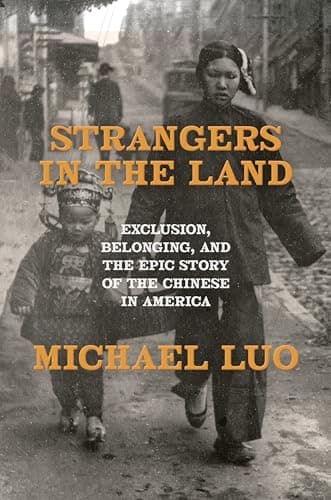Exclusion was policy, not accident.
Luo dissects how the 1882 Chinese Exclusion Act became a template for future bans.

Book summary
by Michael Luo
Exclusion, Belonging, and the Epic Story of the Chinese in America
A 200-year narrative of Chinese America, from exclusion to belonging
Topics
Read this as both historical narrative and contemporary analysis. Use Readever to highlight connections between past immigration policies and current debates, and note how personal stories illuminate broader structural patterns. The AI insights will help you understand the continuity of exclusionary policies and resistance strategies across different eras.
Things to know before reading
Luo braids archival research, court transcripts, and oral histories to follow Chinese migrants from the Gold Rush labor camps through the Chinese Exclusion Act, World War II alliances, McCarthy-era suspicion, the model-minority myth, and the pandemic backlash. He anchors national policy swings in intimate family stories—especially those of the Chinese American women whose letters and lawsuits pried open pathways to citizenship.
Each era in the narrative offers a different lever for change.
Luo dissects how the 1882 Chinese Exclusion Act became a template for future bans.
Luo foregrounds diaries, church newsletters, and family archives rather than outsider reporters.
The book links Cold War loyalty hearings to COVID-era harassment and the 2021 Atlanta spa murders.
Open Readever's reader to highlight passages, ask the AI companion questions, and keep exploring without paying a cent.
The book supplies richly sourced case studies you can cite in classrooms, DEI workshops, or civic forums. Luo shows how coalitions won reforms—from birthright citizenship to voting access—while warning how quickly progress unravels when xenophobia resurges.
Key idea 1
Luo dissects how the 1882 Chinese Exclusion Act became a template for future bans.
By tracing the lobbying of West Coast politicians, railroad barons, and labor unions, the book shows how racism became embedded in immigration bureaucracy—birth certificates, merchant exemptions, paper sons. Understanding these mechanics clarifies why today’s reforms must tackle both rhetoric and paperwork.
Remember
Key idea 2
Luo foregrounds diaries, church newsletters, and family archives rather than outsider reporters.
He lets Chinese American women narrate their own migrations, from Toisan to Manhattan’s garment lofts to Mississippi grocery stores. These vignettes counter stereotypes by showcasing entrepreneurship, activism, and coalition-building with Black and Latino neighbors.
Remember
Key idea 3
The book links Cold War loyalty hearings to COVID-era harassment and the 2021 Atlanta spa murders.
Luo argues that suspicion of Asian Americans spikes whenever China is cast as an existential rival. He urges readers to scrutinize modern bills on university labs or land purchases so they don’t echo earlier loyalty tests.
Remember
Educators teaching U.S. history or ethnic studies.
Community organizers countering anti-Asian violence.
Policy professionals debating immigration and national-security bills.
Michael Luo is the editor of newyorker.com and a Pulitzer Prize-winning journalist who previously spent a decade at The New York Times covering politics, criminal justice, and religion.
Build your personalized reading stack
Download full-length ePubs in one click with personal cloud storage.
Blend AI-guided insights with tactile note-taking to accelerate reflection.
Follow curated reading journeys tailored to your goals and time budget.
Sync highlights across devices so lessons stick beyond the page.
Sign in to Readever to keep reading with AI guidance, instant summaries, and synced notes.
Start reading Strangers in the Land for free and unlock personalized book journeys with Readever.